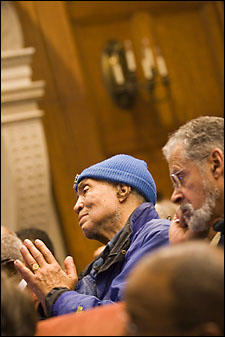Soyinka decries lack of outrage over Darfur ‘pogrom’
Muslim rage over cartoons published in Denmark depicting the prophet Muhammad and the genocidal killings in Darfur, Sudan, may seem at first glance to have little to do with one another, but in a talk April 12, Nobel Prize-winning Nigerian writer Wole Soyinka used the two events to make a powerful case against Islamic territorial ambitions on the African continent.
Soyinka, currently the Alphonse Fletcher Fellow at the W.E.B. Du Bois Institute for African and African American Research, gave a talk sponsored by the Du Bois Institute titled “Darfur, Cartoons, and Other Images of Race.”
Soyinka remarked on how Muslim outrage over the cartoons and the violent demonstrations that followed seemed to take attention away from other important news stories.

“Even the war in Iraq faded into comparative obscurity. Even the genocidal onslaught in Darfur was relegated to the obscure corners of the media,” Soyinka said.
These supposedly spontaneous acts of reprisal for insults against Muhammad resulted in the deaths of many innocent people, he said, including citizens of Soyinka’s native country of Nigeria – “people who had never tasted Danish butter” (one of the targets of proposed Muslim boycotts).
Soyinka characterized these murderous rioters as “psychopaths of faith who issue killing calls for any slight against their religious icons.” He said that while the cartoons were certainly tasteless, the manipulation of rage by cynical leaders was “far more sinister.”
Soyinka wondered why Muslims are not equally outraged by the ongoing “pogrom” in Darfur in which black Africans in the south are being systematically killed and driven from their homes by the Muslim-controlled government in Khatoum.
The Sudanese government’s genocidal campaign against the Darfurians, he contended, is part of a “longstanding project” of Arabization of the southern part of the country inspired by Sudanese leaders Omar al-Bashir and Hassan al-Turabi, former associates of Libyan leader Muammar al-Qaddafi. The campaign is part of a larger plan to spread Arab control over the African continent, Soyinka said.
Soyinka criticized the press for labeling any conflict that breaks out in Africa as “tribal” or “ethnic” but “going silent when the conflict is between the Arab and black world.”
This “bashfulness” about holding Arabs responsible for their crimes extends to history as well, he said. “You can’t speak about the history of slavery without engaging with the Arab role.”
Soyinka gave his talk in front of a blank screen and beside an unused overhead projector. He said that he had planned to augment his talk with photographs of the refugee camps in Darfur, but the visit he was scheduled to take to that region was cancelled by the Sudanese government. The ostensible reason was that it would have conflicted with the Arab summit in Algiers.
“Let us follow the Arab summit closely,” Soyinka suggested, “to see if they put Darfur on the agenda, or will the gathering be too busy deciding whether or not Danish butter can be served for breakfast.”




